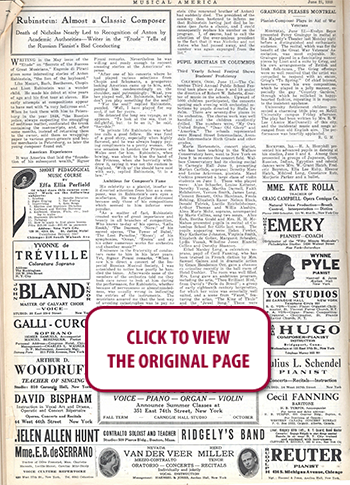 100 YEARS AGO IN MUSICAL AMERICA (286)
100 YEARS AGO IN MUSICAL AMERICA (286)
June 21, 1919
Page 34
Rubinstein: Almost a Classic Composer
Death of Nicholas Nearly Led to Recognition of Anton by Academic Authorities—Writer in the “Etude” Tells of the Russian Pianist’s Bad Conducting
WRITING in the May issue of the “Etude” on “Secrets of the Success of Great Musicians,” Eugenio di Pirani gives some interesting stories of Anton Rubinstein, “the lion of the keyboard.”
Like Mozart, Bach, Beethoven, Chopin and Liszt, Rubinstein was a wonder child. He made his début at nine years of age and his first tour at eleven. His early attempts at compositions appear to have met with “a very ludicrous end.” When he took them with him to Petersburg in the year 1848, “the Russian police, always suspecting the smuggling of seditious matter, confiscated the trunk containing the manuscripts, and, after some months, instead of returning them to the owner, sold them as wrapping paper to various green-grocers and butter merchants in Petersburg, as later the young composer found out.”
American Experiences
It was America that laid the “foundation of his subsequent wealth,” Signor Pirani remarks. Nevertheless he was willing and ready enough to recount amusing stories at the Americans’ expense.
”After one of his concerts where he had played various selections from Chopin and Schumann, a prosperous looking American came up to him, and, patting him condescendingly on the shoulder, said patronizingly: ‘Waal, you hev played well, Mr. Rubinstein, but why don’t you play something for the soul?’
“‘For the soul?’ replied Rubinstein, puzzled. ‘Well, I have played for mysoul, if not for yours. . .’”
He detested the long sea voyage, as it appears. “To look at the sea, that is delightful, but to be on it,” he said, “horrible!”
“In private life Rubinstein was what one calls a good fellow. He was fond of a good story, especially when highly flavored, and he was always happy paying compliments to a pretty woman. On one occasion in London the Princess of Wales sent for him. Rubinstein, when bowing, was about to kiss the hand of the Princess, when she hurriedly withdrew it, saying it was not the custom in England. ‘With us’ (he ·should have said with me), replied Rubinstein, ‘it is a law.’”
Ambitious for Composer’s Fame
His celebrity as a pianist, insofar as it diverted attention from him as a composer, was in Rubinstein’s own eyes a misfortune. He was further distressed because only those of his compositions which seemed to him inferior were popular.
“As a matter of fact, Rubinstein created works of great importance and beauty in all branches of composition. Who knows to-day of his operas, ‘Lalla Rookh,’ ‘The Daemon,’ ‘Nero;’ of his sacred operas, ‘The Tower of Babel,’ ‘The Lost Paradise,’ ‘Moses’; of his symphonies, ‘Ocean,’ ‘Eroica’ and all his other numerous works for orchestra and chamber music?”
Eminence in the fraternity of conductors came to him in his later years. Yet, Signor Pirani remarks, “When I saw him direct a concert of the Imperial Russian Musical Society, I was astonished to notice how poorly he handled the baton. Afterwards some of the members of the orchestra told me they took care never to look at him during the performance, for Rubinstein, whether because of nervousness or absent-mindedness, was usually wrong in indicating the entries of the instruments. The musicians assured me that the best way of avoiding catastrophes was to pay no attention to his signs.”
An Anecdote and a Bon Mot
Signor Pirani tells a story of his own recital at the· Philharmonic Academy in Bologna in 1881 which throws some light on the punctiliousness of the academic mind in program-making. “The program, which Signor Pirani submitted to the academy authorities several days in advance, included something of Rubinstein’s. The president of the academy, however, informed me that Rubinstein, being still among the living, could not be considered as a classic, and requested me, therefore, to cancel the number. The day of the concert a telegram from Paris announced that Nicholas Rubinstein (the renowned brother of Anton) had suddenly died. The president of the academy then hastened to inform me that Rubinstein having just died he became ipso facto a classic, and I could consequently replace his number on the program. I, of course, had to call the attention of the over-zealous president to the fact that it was Nicholas and not. Anton who had passed away, and the number was again expunged from the list.”




 RENT A PHOTO
RENT A PHOTO





